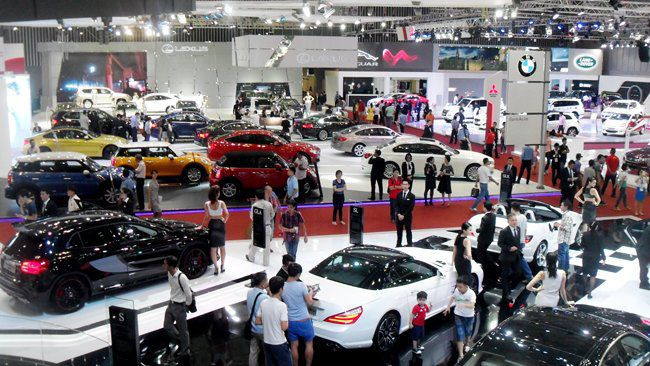Signing Vietnam - EU FTA: Will car prices decrease?
After Vietnam and the European Union (EU) announced the conclusion of negotiations on the free trade agreement (FTA), many people hope that the selling price of imported cars from this region will decrease.
However, many opinions say that this is unlikely to happen when the Government previously had a plan to adjust the application of special consumption tax on automobiles in the near future.
 |
Many luxury cars imported from Europe at an auto show in Ho Chi Minh City |
According to the Vietnam - EU FTA negotiation agreement, cars from the European region imported into Vietnam after 10 years of implementing the agreement will have their taxes completely reduced, in which cars with large engines over 3000cc for gasoline engines, and over 2500cc for diesel engines will be liberalized one year earlier.
Currently, many major European car brands have opened businesses in Vietnam, such as MINI, Audi, BMW, Mercedes-Benz, Renault, Land-Rover, Porsche... These expensive car lines have entered the Vietnamese market in recent years mainly through imports, except for Mercedes-Benz which assembles some models in the domestic market.
The dealers and importers of high-end cars are also expanding their business systems, developing repair and maintenance service centers across the country, not inferior to domestic car assembly joint ventures. However, the important thing is that domestic consumers still have to buy cars of these brands at exorbitant prices because the import tax on cars in this area is still high.
Thus, when the Vietnam - EU FTA is officially approved with the import tariff schedule for cars into Vietnam as planned above, according to some businesses, the price of imported cars from this region will certainly decrease according to the schedule.
However, some other opinions say that this reduction in car import tax is not the decisive factor in reducing product prices in the domestic market.
Speaking to Vietnam Television VTV1 on the evening of August 4 regarding the elimination of 99% of import tariffs after the Vietnam - EU Free Trade Agreement is signed, Mr. Le Trieu Dung, Deputy Director of the Multilateral Trade Policy Department (Ministry of Industry and Trade) and also a member of the Vietnam Negotiation Delegation, also said that although import tariffs on cars from the European region to Vietnam will be reduced, this is not the only factor affecting car prices.
Observers also believe that the special consumption tax for this luxury car product line will likely be adjusted upward to compensate for the reduced import tax.
In fact, in mid-July, the Government Office announced the conclusion of Prime Minister Nguyen Tan Dung at the Government Standing Committee meeting on the mechanism and policy for implementing the Strategy and Planning for the development of Vietnam's automobile industry. According to this announcement, the Prime Minister assigned the Ministry of Finance to preside over and coordinate with the Ministry of Industry and Trade and relevant ministries and branches to urgently develop a plan to amend the policy on special consumption tax and corporate income tax for the automobile industry, report to the Government for consideration, and submit to the National Assembly at the 10th session of the 13th term.
Specifically, the Prime Minister requested to adjust the special consumption tax rate according to the principle of dividing into smaller groups, referring to the experience of some countries in the region in the direction of reducing the special consumption tax rate for priority development vehicles. In addition, the Prime Minister agreed to apply a high special consumption tax rate for vehicles with up to 9 seats with engine capacity over 3.0 liters, high fuel consumption, large size not suitable for traffic infrastructure conditions and people's income, large emissions into the environment, and vehicles with up to 9 seats with large absolute value.
Meanwhile, imported cars from Europe to Vietnam, especially expensive cars, often have large capacities of 2500cc (2.5 liters) or more.
Currently, there are three special consumption tax rates for passenger cars with 9 seats or less: 45% for cars with a capacity of less than 2.0 liters, 50% for cars from 2.0 to 3.0 liters and 60% for cars over 3.0 liters. With the above direction of the Prime Minister, car manufacturers and traders believe that there is a possibility that in the near future, the special consumption tax on passenger cars will have more levels. Thus, it is likely that in the near future, cars with a capacity of over 3.0 liters will be subject to a special consumption tax higher than the current rate of 60%.
Previously, the Ministry of Industry and Trade also had a plan to divide vehicle capacity levels to apply taxes and impose the highest tax of up to 195% on vehicles with a capacity of over 6.0 liters.
If the policy of adjusting the special consumption tax to a higher level is implemented, it is likely that luxury cars from European countries entering Vietnam will be sold at prices that are not as reduced as many people expect, even though the import tax from this region to Vietnam is reduced. There is an opinion that the price of some cars with a large capacity of over 6.0 liters will be even higher than the current selling price.
According to VOV






